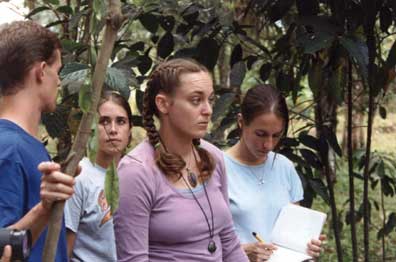October 30, 2003 - PCOL: One Returned Volunteer Speaks Out
Peace Corps Online:
Peace Corps News:
Special Reports:
October 26, 2003: Dayton Daily News reports on Peace Corps Safety and Security:
October 14, 2003 - Peace Corps Report: The Peace Corps Responds: Peace Corps 2002 Report on Volunteer Safety :
October 30, 2003 - PCOL: One Returned Volunteer Speaks Out
- Comments Friday, October 31, 2003 - 6:55 am [1]
One Returned Volunteer Speaks Out

Read and comment on this email that we received from a Returned Volunteer that we found particularly disturbing but also noteworthy because it provides some guidance on the changes that need to take place at Peace Corps Headquarters and at the Country Director level to effectively address the issues of Volunteer Safety and Security that have been raised by the Dayton Daily News series. We have been asked to post the message without attribution. However, if anyone at Peace Corps Headquarters is interested in pursuing this conversation, we can put you in touch with the author. Read the message at:
One Returned Volunteer Speaks Out*
* This link was active on the date it was posted. PCOL is not responsible for broken links which may have changed.
One Returned Volunteer Speaks Out
The apparent lack of interest and concern for security at the upper middle ranks of the PC Staff and more importantly the people who conduct the personal interview process for PC Country Directors, etc. is shocking. The latter, as you probably known, are typically ex-PC folks who are now working outside the PC.
Approximately a year ago, I had an interview for a country Directorship ( I personally was interested in only one particular country in an area which is porous from a security point of view). When asked what I thought the most important concerns for a Director would be, I said that security would be one item at the top of my list. This response clearly struck the six or so people interviewing me as uninteresting and exaggerated. When later asked whether I had any questions, I asked whether as a Country Director, I could pull people out based on my own judgment if I concluded the situation threatening (figuring that terrorist/kidnappers don't usually wait for folks to check up the bureaucratic chain). The question produced only unequivocal responses and reflected the sense that it was really not important and why was I bringing it up. Obviously, none of the people in the room appeared to have worked in volatile areas or in the post 9/11 environment. They gave the clear impression that they did not have a clue. Throughout they reflected a certain laid back attitude that is the type that gets people killed. It is analogous to the attitude of some NGOs in Iraq who refuse to put up barriers since they think being an NGO, the UN or the Red Cross/Crescent is somehow going to matter to politically motivated suicide bombers. Such naiveté is distinctly unhelpful to the people who are blow to pieces. PCVs are very soft targets and a healthy interest in their personal safety and related matters should be a big plus when looking for senior field personnel.
My career has been 100% international and I have held a very senior position in the US government dealing with international security affairs, including nuclear arms. Having myself worked in and out of government in zones of political violence such as Ethiopia/Eritrea, Vietnam, Bosnia, Mozambique and some other choice spots, against this experience I found the PC personnel I encountered "out of touch" or at best very insensitive in the security area vis-a-vis the volunteers they were putting in the field and with little interest in what I might call "tighter management". In general, I found the interviewers much more preoccupied with assuring that directors would meet their preconception of individuals who would fit the traditional PC bureaucratic mold rather than attending to the need for security and to keeping PCVs, as much as possible, out of local political maelstroms. Among other things PCV security today requires a higher than traditional level of cooperation/interaction with appropriate Embassy personnel. As someone who has been responsible for people in the private sector who work in challenging regions, I find it unacceptable that PC personnel would have a lower attention level in this area than corporations. It is the Country Director and the people who appoint them that are key to improving the security situation. The individual in charge of security for the PC is concerned but he is like a voice crying in the wilderness - to borrow a phrase.

Some postings on Peace Corps Online are provided to the individual members of this group without permission of the copyright owner for the non-profit purposes of criticism, comment, education, scholarship, and research under the "Fair Use" provisions of U.S. Government copyright laws and they may not be distributed further without permission of the copyright owner. Peace Corps Online does not vouch for the accuracy of the content of the postings, which is the sole responsibility of the copyright holder.
This story has been posted in the following forums: : Headlines; Safety and Security of Volunters
PCOL8348
76
.
|
By bankass.com (0-1pool136-56.nas12.somerville1.ma.us.da.qwest.net - 63.159.136.56) on Sunday, December 07, 2003 - 6:44 pm: Edit Post |
You are right. They are unqualified and callous toward safety issues. That is attitude at Peace Corps. Get rid of the so called trouble makers who have gone through a safety issue. You demonstrate one of the main problems with the agency and safety concerns. But, they want more money for more safety personell for more bureaucracy without doing a simple response that will reduce violence and that is to couple volunteers at every site Peace Corps locates volunteers. It will reduce violence against volunteers more than a 10 million dollar budget for safety personnell.
Its too simple for them.


